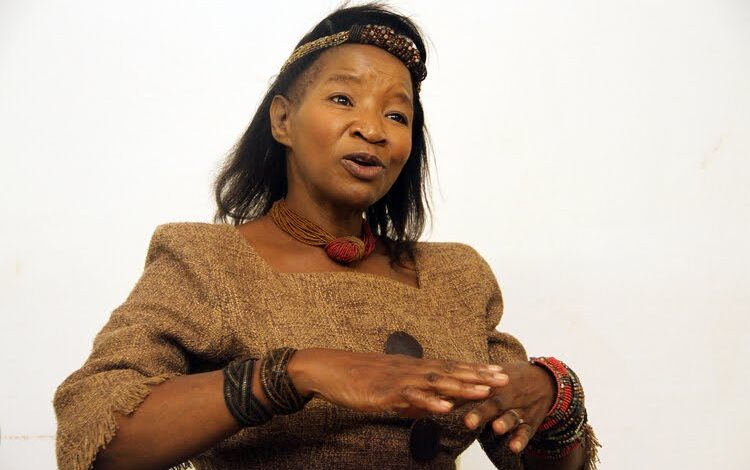Shuvai Wutawunashe: The Gospel Legend Who Revolutionized Zimbabwe’s Music Scene

The unforgettable lyrics of “Nditorei, ndinatsei, ndisukei woooo Mwari yowe, Ishe…” from the iconic song “Nditorei” have become an anthem in Zimbabwe’s gospel music scene, resonating deeply with fans across generations.
Shuvai Wutawunashe, with her captivating voice and signature afro hairstyle, was the radiant lead singer of The Family Singers. In the early 1980s, the group became a beacon of hope, pioneering the gospel music movement in Zimbabwe. Their album African Praise remains a monumental collection, often remembered as the first celebration of praise music in the country.
The Family Singers, including talented members like Jonathan and Shuvai Wutawunashe, Simon Muyambo, and others, captured the spirit of a nation eager for both spiritual and cultural expression. Shuvai’s performances quickly won her the hearts of audiences, making her a beloved figure in the gospel music scene.
Fast forward to today, Shuvai has returned to Zimbabwe after many years abroad, most recently in Saudi Arabia, where her family has been involved in public service and diplomacy. She is now gearing up to perform at the inaugural Gospel Legends Night this weekend at Rainbow Towers. The event promises to be a spectacular celebration of gospel music, featuring artists such as Pastor Haisa, Mechanic Manyeruke, The Charambas, Carol Mujokoro, Fungisai Zvakavapano-Mashavave, and Pastor Bonnie Deuschle.
In a recent interview, Shuvai reflected joyfully on her last performance at a televised National Thanksgiving event at State House, where she sang “Nditorei” with the police band. “I was overjoyed to sing for our nation’s leaders and to be surrounded by so many Zimbabweans,” she shared.
Living in Saudi Arabia with her family, Shuvai has dedicated her life to public service since the 1980s. She is proud of her children and grandchildren, all of whom share her passion for music. “We are blessed with a beautiful family,” she said with a smile.
Last month, Shuvai celebrated another personal milestone: she graduated with a Master of Philosophy degree in Culture and Diplomacy from Great Zimbabwe University (GZU). This achievement reflects her commitment to fostering cultural dialogue and global engagement, which she holds close to her heart.
When not involved in music, Shuvai also runs a farm in Masvingo and a consultancy called the Harare School of Protocol. “I keep busy with farming and consulting when I’m back home,” she explained.
After 43 years in the music industry, Shuvai attributes her ongoing passion to divine strength. “God has been faithful, inspiring me to continue sharing His message through song,” she said.
Her voice, rich with experience, is a reminder of her long journey in gospel music, a journey that began when many of today’s gospel enthusiasts were not yet born. Shuvai believes Zimbabwe’s hard-won independence played a key role in unlocking the creativity that fueled gospel music’s growth. “We’ve come a long way, and it’s important to celebrate how far we’ve come,” she noted.
As Shuvai steps back into the spotlight, her story is one of resilience, passion, and a deep commitment to her craft. She’s not just a singer but a symbol of hope and faith.
Looking back, Shuvai recalls a defining moment in 1982 when The Family Singers recorded her original composition “Tarira Nguva.” The song quickly gained popularity, remaining on the charts for nearly a year. Behind this success, however, was a story of determination. Shuvai explained that her husband Jonathan faced skepticism from Teal, the leading recording label at the time, which believed that religious music was fading in popularity. But Jonathan’s steadfastness paid off; he promised to buy all unsold records, which led to “Tarira Nguva” becoming a huge hit. The song was even included in the early ’80s compilation Zimbabwe’s Greatest Hits, Volume One, which was licensed internationally, including by Shanachie Records in Europe.
Shuvai fondly remembers the moment her music reached international audiences. “It was a proud day for me when I discovered our album in Washington DC after our family’s diplomatic posting in 1984,” she said.
Throughout her illustrious career, Shuvai has played a vital role in shaping Zimbabwe’s gospel music scene. She and her husband have supported countless artists, both established and emerging, helping to raise their profiles and expand their ministries. In the early 1990s, The Family Singers founded one of the first independent recording studios, Shelter, providing a platform for aspiring artists to thrive.
Shuvai’s impact also extends to live performances and video productions, which helped popularize gospel music. She recalls exciting performances at venues like the Harare International Conference Centre (HICC) and the College of Music. Over the years, she has written numerous songs that have become national treasures, including “Nditorei” and “Rudo Rukuru.” Her husband, Jonathan, has also contributed iconic songs, such as “Vana Vanokosha,” which became a signature tune on ZBC TV.
Shuvai’s musical journey is not without challenges. “While many songs have been recorded, some are still waiting to be brought to life in the studio,” she said, acknowledging the difficulty of keeping pace with an ever-evolving music landscape.
Looking at the evolution of gospel music, Shuvai is amazed at how far it has come. “In the ’80s, the gospel audience was almost non-existent, but now it’s a thriving community that embraces all genres of gospel music,” she said. She recalled the controversies they faced when introducing guitars into church music, an idea initially criticized but now widely accepted.
Today, gospel music encompasses everything from traditional hymns to pop, jazz, reggae, and hip-hop, and Shuvai is impressed by the genre’s growth. “In the past, songs were often focused on Bible stories and hymns,” she explained. “Now, artists draw from their personal experiences with Christ, adding a new depth and meaning to the genre.”
However, she cautioned that some songs today lack the depth of earlier works, as not all songwriters fully understand the artistry of crafting meaningful lyrics.




